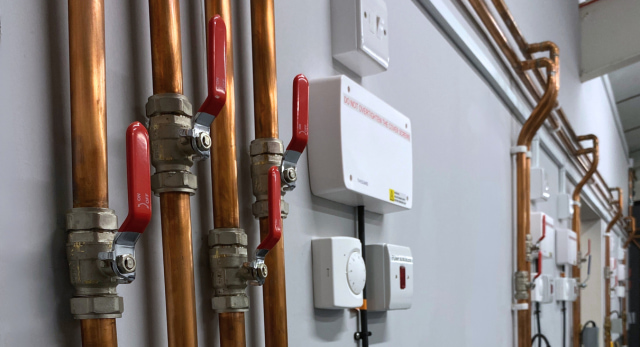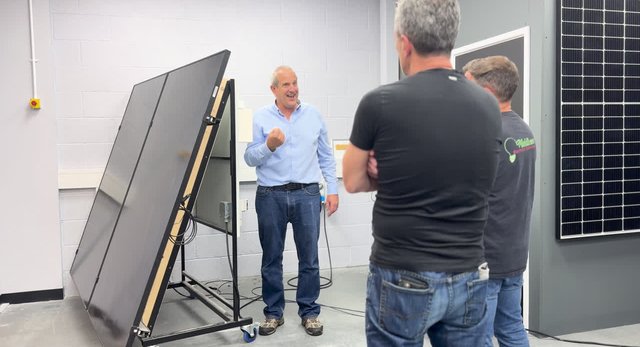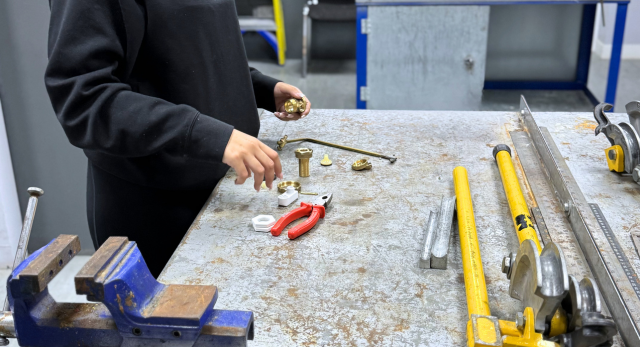In the UK, both trades promise high salaries, job stability, and regular work, but each suits different skills and interests. Plumbers are in constant demand for water, heating, and renewable energy solutions, while electricians are needed to power homes, install smart tech, and support the nation’s shift to net-zero. To be honest, a career in either trade will give you interesting and varied work day-to-day, plus the potential to grow and specialise, in years to come. This detailed article gives you clear, expert advice and the latest career trends to help you decide which trade fits your goals, strengths, and future ambitions to make it easier to choose the best path for your success.
Plumbers vs. Electricians
| Factor | Plumber | Electrician |
|---|---|---|
| What they do | Install, maintain, and repair water & heating systems | Install, maintain, and repair electrical systems |
| Working environments | Homes, commercial buildings, construction sites | Homes, commercial buildings, construction sites |
| Career progression | Gas engineering, renewables, self-employment | Specialist roles (EV, renewables), self-employment |
| Salary (avg) | £32,400 – £46,000 | £33,000 – £48,000 |
| Demand in UK | High, with essential call-out need & upskilling | High, boosted by renewables, housing & EV growth |
| Training time | 6 weeks – 2+ years | 4 weeks – 3 years |
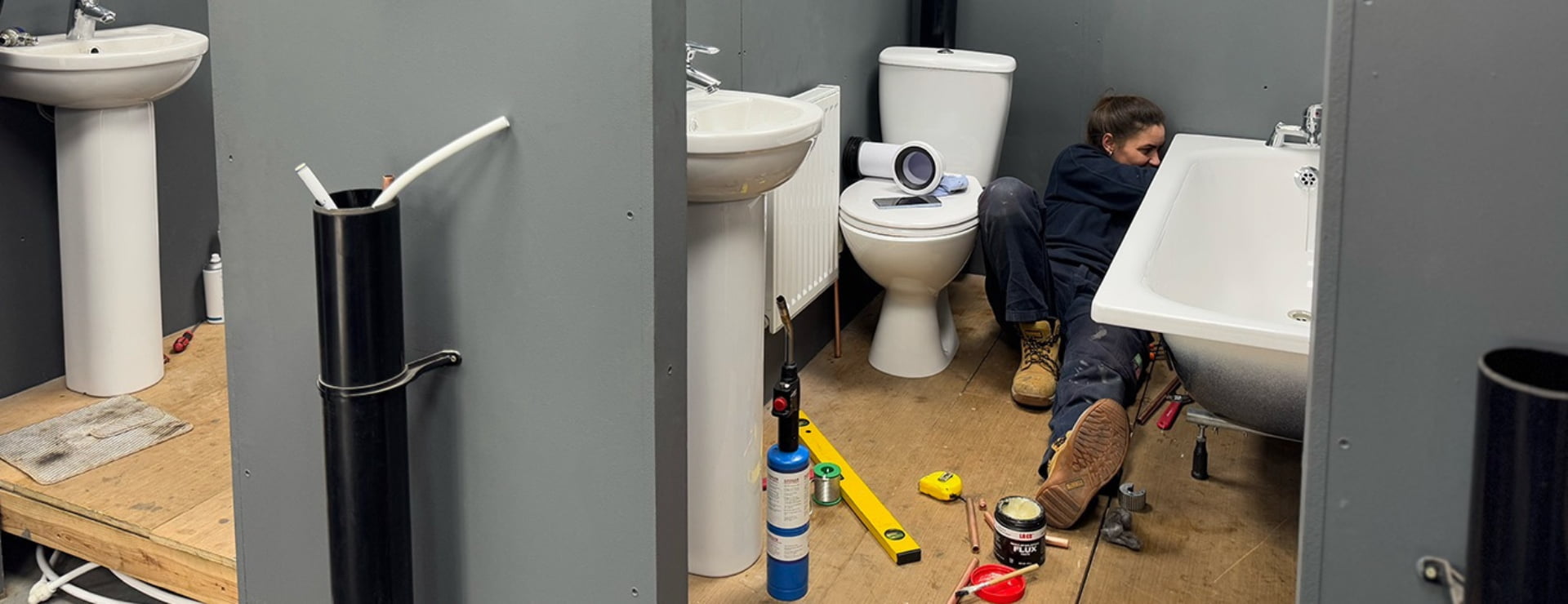
What Does a Plumber Do?
Plumbers are experts in water systems, heating, and pipework. Your work will range from installing bathrooms, kitchens and radiators, to fixing leaks, fitting boilers and heat pumps. You may also move into more advanced areas like renewable heating (think air source heat pumps or solar thermal systems). Continuing professional development is crucial—technology and regulations are constantly evolving. Read more on progressing in the sector with our AI in Plumbing: The Future of Smart Water Systems blog.
Examples of Plumbing Jobs
- Respond to emergency leaks or blockages
- Change over water-based appliances (taps, sinks, toilets etc)
- Install a new hot water cylinder
- Fit energy-efficient solutions for homes & businesses
- Repair water inlet pipes
Is Plumbing a Secure Career?
Even in economic downturns, the need for well-trained plumbers remains constant. Leaks appear and appliances fail, whatever the markets do. In the era of sustainability, plumbing is at the forefront of decarbonising the UK’s heating systems. The Government’s ongoing policies, including the ban on new gas boilers in new builds, elevate the importance of plumbing professionals with up-to-date skills in heat pumps and renewables. Plumbers can look to get into heat pumps if they are trained just on the plumbing side of the industry but also if they are trained in the heating side.
Typical Plumber Salaries
- New entrant (after training): £26,000-£28,000
- Fully qualified: £32,400-£39,000
- Highly experienced or specialist: £46,000+
- Day rates: Range from £180 to £700 per day. The average daily rate is £331 per day.
- Self-employed plumbers often earn more depending on hours and work type.
More on salary averages and factors in our dedicated How Much Do Plumbers Charge article.
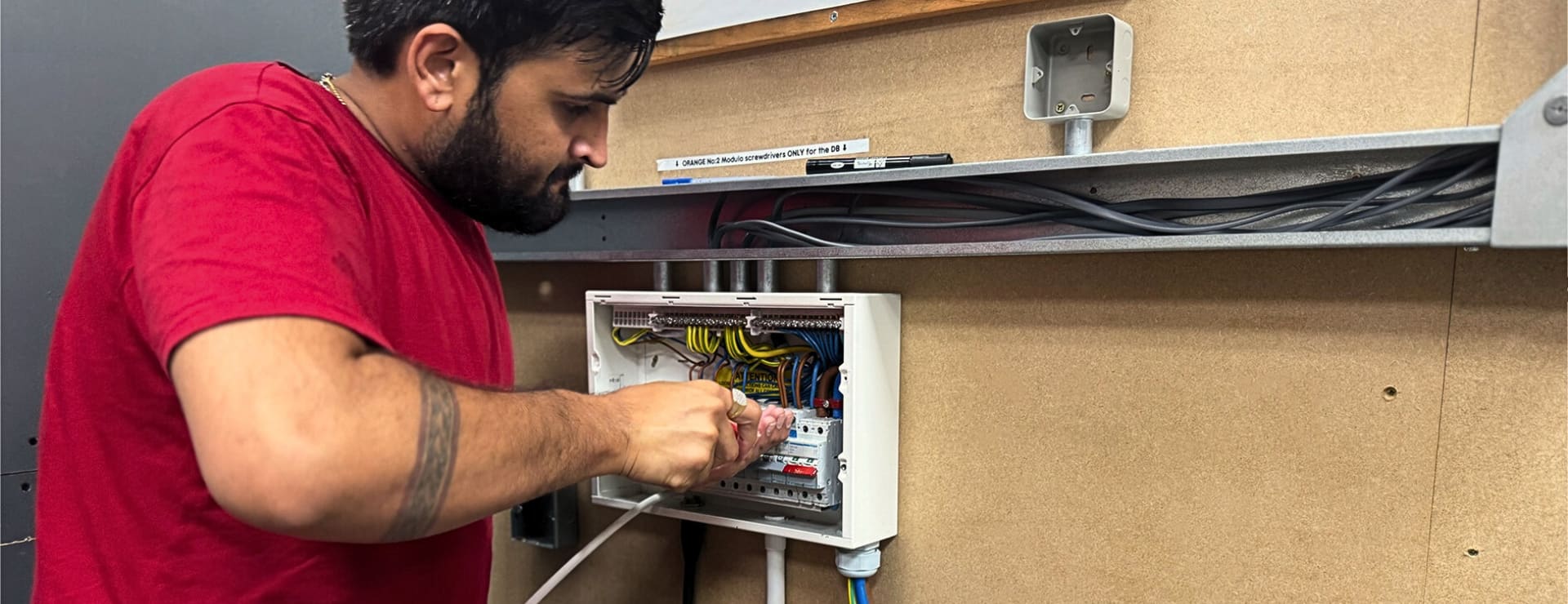
What Does an Electrician Do?
Electricians install, maintain, and repair electrical wiring, systems, and fixtures. From homes and offices to retail spaces, their expertise is critical for safety and energy efficiency. Electricians are also leading the charge (literally) on renewable technologies such as installing EV charging points, battery storage, and solar. As homes and businesses digitise, the breadth of opportunities grows every year.
Examples of Electrical Jobs
- Install or upgrade consumer units (fuse boards)
- Fit lighting, sockets, and smart home systems
- Commission and fault-find on renewable tech (solar, EV, etc.)
- Maintain and inspect commercial installations
Is Being an Electrician a Long-Term Bet?
Absolutely. The UK’s push towards net zero, the rapid growth of electric vehicles, and toughened safety regulations make qualified electricians hot property. Homeowners are upgrading older wiring to meet modern safety standards. Only trained, certified professionals can legally install or verify most modern electrical work, especially as smart technology becomes standard.
Electrician Salaries
- New entrant (after initial training): £27,000+
- NVQ Level 3 qualified: £33,000-£38,000
- Specialist/experienced/contractor: £48,000+
- Day rates: Range from £125 to £600 per day, with the average at £335
- Self-employed electricians often earn more depending on hours and work type.
Many electricians run their own businesses, significantly increasing their earnings as reputation and expertise grow. If you want to see how much electricians earn, read our article on Electrician Day Rates in the UK.
What Skills and Qualities Are Needed?
It’s important to know that both plumbers and electricians would benefit from having similar skills. The main difference comes from the practical skills needed to carry out the respective jobs.
Both plumbers and electricians will need to have an excellent understanding of the regulations within their sectors. Other than the practical skills, plumbers will need to have a good understanding of water regulations as well as cold and hot water systems safety. For electricians, they will need to understand the 18th edition wiring regulations along with the practical skills needed to complete jobs.
Some qualities that would help both plumbers and electricians:
- Logical approach and curiosity
- Ability to work under pressure and multitask
- Enjoyment of problem-solving
- An eye for practical detail
- Proficient with maths and pattern recognition
- Strong initiative and capacity to work independently or in a team
- Approachable and easy to talk to
- Understanding of others’ needs
Not sure which trade fits you? Read our blog on Barriers to Entering the Trades
Career Progression and Future-Proofing
Plumbers
Plumbing offers a wide range of career progression routes and opportunities to future-proof your skills. As you develop your expertise, you can transition into high-value specialisms such as gas engineering, heating design, and renewable energy installations, including air source and ground source heat pumps, greywater and rainwater harvesting, or solar thermal integration. These roles support the UK’s Net Zero goals and open doors to lucrative niches, with many plumbers specialising in the installation and maintenance of sustainable systems. Specialist certificates in areas like unvented hot water, water regulations, or legionella risk prevention can further boost your earning potential and employability.
Beyond technical skill, plumbing provides excellent opportunities for entrepreneurship; experienced tradespeople often strike out on their own, becoming self-employed contractors or building successful businesses. This route can increase both flexibility and income, with successful business owners earning £50,000 or more per year, depending on reputation and specialisation. There are also pathways into supervisory, project management, or teaching roles within training organisations or colleges, further broadening your career landscape.
Continuous learning is vital. The more you invest in upskilling and certifications, the better positioned you’ll be for long-term stability and advancement.
Electricians
For electricians, the industry is equally dynamic, shaped by growth in renewables, smart technology, and the electrification of transport. You can specialise in areas like solar power, heat pumps, EV charging points, and smart home automation. Such specialisms are central to government sustainability targets and widespread adoption of low-carbon technologies, creating robust demand for skilled professionals.
Progression routes include roles in inspection, testing, and accreditation, or management positions on larger projects or within major firms. Many electricians set up their own businesses, giving them control over their schedules and earning potential. Running an electrical contracting business allows for hiring additional staff, taking on larger contracts, and scaling operations to attract those who want autonomy and entrepreneurial challenge.
Electricians can also choose to retrain, upskill, or cross-train into adjacent sectors or management roles. Whether you’re just starting out or switching careers, the estimated need for thousands of new electricians to meet national targets for solar and renewables means the career is exceptionally future-proof.
Digital Technology and AI
Digital technology and artificial intelligence (AI) are driving change across both plumbing and electrical trades. Construction and building services are integrating digital tools such as Building Information Modelling (BIM), robotics, and AI-powered data analysis to streamline design, installation, and maintenance. AI project management platforms optimise scheduling and resource allocation, while predictive maintenance systems minimise downtime for machinery and installations.
For plumbers and electricians, these technologies mean new opportunities. Working with smart home devices, automated systems, and cloud-based diagnostics, as well as the ongoing demand for professionals who can bridge the gap between traditional skills and modern, data-driven solutions. Tradespeople willing to upskill and embrace new tech remain enormously valuable, taking on roles that are immune to outsourcing and automation due to their hands-on and problem-solving nature.
The big issue for many sectors is the emergence of AI. Whilst it will impact the trades, it will do so in a positive way due to the practical skills required to be a plumber or electrician. If you’re concerned about AI or want to learn more about its impact on the trades, read our insight into AI Job Losses & Why Tradespeople Are Safe From AI.
By investing in your education, training and adaptability, you can ensure a resilient, rewarding career in either plumbing or electrical work to position yourself at the heart of a growing, tech-driven sector.
Comparing Training Routes
Both trades have options for faster entry and more extensive professional certification. At Logic4training, we offer flexible training packages tailored to your background and goals.
Plumbing Training
At Logic4training, we have a range of plumbing training packages for new entrants. Our most basic, Bronze package, is an ideal starting point, giving you a solid foundation in the trade in just six weeks. Then there are further options available in the shape of Silver, Gold and Platinum packages, where you dive deeper into the subject and gain a wider variety of skills to broaden your options for work on completion of the course. The Gold and Platinum packages expand your trade knowledge into the gas industry, and you’ll also work towards becoming Gas Safe registered.
If you’re looking to retrain as a plumber, you can read our article Retrain as a Plumber in 2025: Everything You Need to Know for more details.
Electrician Training
You can train to be a Domestic Electrical Installer in as little as four weeks with our Bronze electrical training, but this is a basic qualification and the electrical work you can do will be limited. Our electrical Silver and Gold electrical packages
Fast-track electrician courses can be useful for specific people who are looking to train and enter the industry quickly, but there are also so hidden risks associated with them. If you want to become fully qualified, you’ll need to achieve an NVQ Level 3 qualification which can take as long as three years. Like everything else, the more you put in, the more you get out, so we’d recommend taking your time and gaining some good practical experience on the way. Search online to find the best option for you.
If you’re looking to retrain as an electrician, you can read our article Retrain as an Electrician in 2025: Everything You Need to Know for more details.
Apprenticeships are also another option to train to become a plumber or electrician. Apprenticeships are a much longer method of training and aren’t best for everyone, but at Logic4training, our course advisors will talk you through all the options to help find the training option that suits you best.
Why Choose a Skilled Trade in 2025?
The UK’s construction and building services sectors are experiencing robust growth, offering diverse opportunities for skilled tradespeople. Several key trends are driving this demand:
Economic Stability and Security
Unlike many office-based roles that are at risk from AI automation or remote outsourcing, trades remain grounded in essential, on-site work. There will always be demand for hands-on professionals who can diagnose, repair, and install systems in person. Employers value practical expertise with up-to-date certifications, ensuring continued high demand and stable income, regardless of economic changes.
Ambitious Housing Targets
The government’s commitment to building hundreds of thousands of new homes each year has led to a surge in construction projects nationwide. Every new build requires skilled trades—from installing plumbing systems and electrical wiring to fitting renewable technologies and safety features. Electricians and plumbers play a central role in ensuring new homes are safe, energy-efficient, and compliant with modern standards.
Sustainability and Net Zero Goals
Britain’s pledge to reach net zero by 2050 is transforming the building services industry. Renewable energy installations, such as heat pumps, solar panels, and electric vehicle charging points, are fast becoming standard. Both electrical and plumbing sectors are at the forefront of this transition, with increasing opportunities for those skilled in green technologies and sustainable solutions.
Growing Need for Upgrades and Retrofits
With older housing stock making up a large part of the UK’s properties, there is a constant need for refurbishment, including upgrades to electrics, plumbing, heating systems, and insulation, to meet current standards and improve efficiency. Skilled tradespeople are indispensable for these projects, providing essential services to homeowners and landlords.
Changing Careers and Workforce Renewals
As many experienced tradespeople retire, and as people seek more rewarding jobs post-pandemic, there has never been a better time to retrain or upskill. Skilled trades offer a genuine chance to start afresh. Whether you’re early in your career, switching industries, or returning to work after a break. Training is accessible and flexible, with Logic4training courses designed to fit around different lifestyles.
Career Variety and Progression
The trades are dynamic and always evolving. Entry-level roles can quickly lead to specialist, supervisory, or management positions. Many tradespeople go on to start their own businesses, diversifying into areas such as renewables, smart homes, or consultancy.
Choosing a skilled trade in 2025 is not just about earning a good wage, it’s about future-proofing your career, playing a direct role in the UK’s growth story, and enjoying challenging, meaningful work every day. If you want to find out how trade skills can build a lasting career, explore Trade Skills That Matter: The Best Trade to Learn in the UK for a deeper dive.
FAQs
Can I train as a plumber or electrician later in life?
Yes, many of our students are career changers. Our courses are designed for all ages and backgrounds, offering both full-time and flexible learning options.
Which trade is easier to learn for beginners?
It depends on your strengths. Plumbing is more hands-on and physically demanding, while electrical work requires strong attention to detail and a good grasp of maths.
Will AI or automation replace plumbers or electricians?
Unlikely any time soon. Both trades require on-site judgement, adaptability, and practical skills. AI is making work smarter, not redundant—opening up new specialisations in both fields.
What qualifications do I need to work legally in the UK?
You’ll need nationally recognised qualifications such as a Diploma or NVQ Level 2/3 or equivalent for full status. Some work (like electrical installations) can only be signed off by fully qualified individuals who hold the AM2 qualification and hold their gold card.
How do I choose the right training course?
It depends on your goals, current experience, and whether you prefer classroom or blended learning. Contact our team for expert guidance, or review our training packages.
